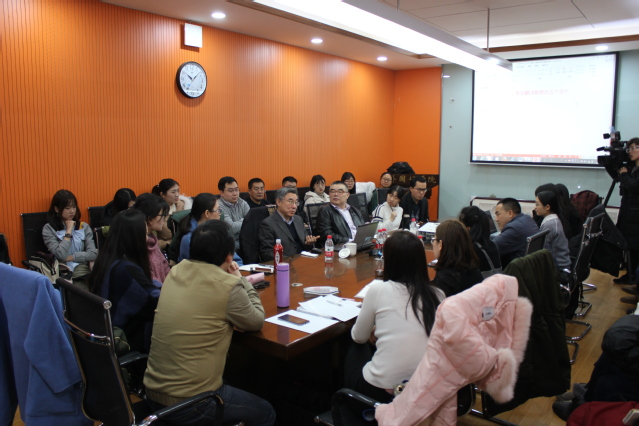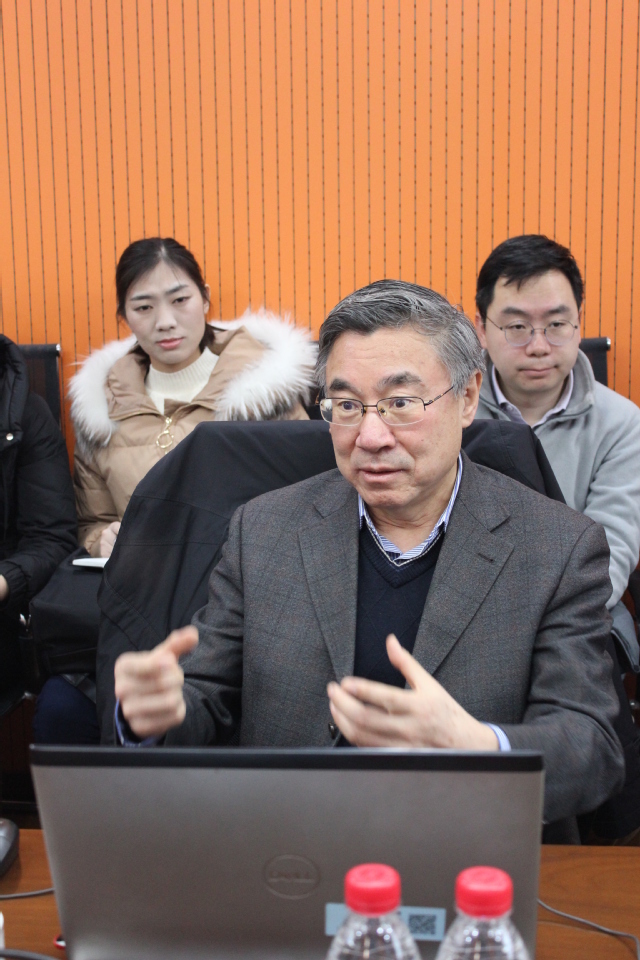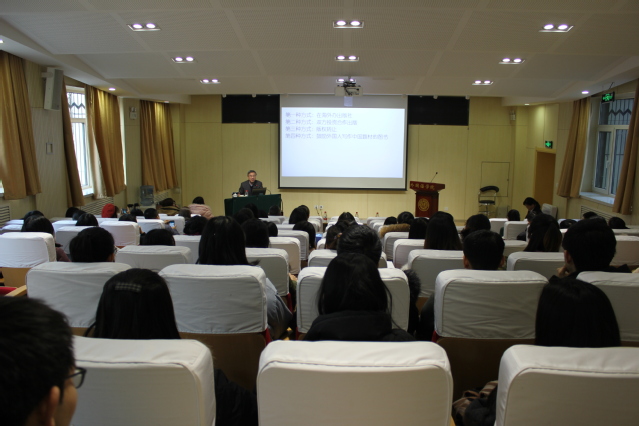
On the fourteenth day of January, Huang Youyi, the chief editor of Chinese Translators Journal, was invited to the Nankai University Centennial Grand Forum. On the forum he gave a wonderful academic lecture – From Translating the World to Translating China, in front of crowds of NKU teachers and students. In this lecture Mr. Huang recalled his years’ exploration in translation practice in the grand background of “Reform and Opening up” and shared amounts of experience with the audience. Mr. Huang is also member of CPPCC, member of Academic Degree Commission of the State Council, Vice president of Translators Association of China as well as the president of China National Committee for Translation and Interpreting Education.
In this lecture Mr. Huang stated that China had witnessed two great stages in translation practice. The first stage paced with the progress of Reform and Opening up, in which the translators were dedicated to translate those advanced materials of many foreign countries including the documents in science and technology, the classical literature works and the management experience. The first stage appeared in the beginning of this century and is undergoing its development and transformation. He emphasized that, since China has progressed rapidly in every aspect, it is time to utilize translation practice to show to the outside world our national spirit, national character and core socialist values, demonstrate what we have achieved since the Reform and Opening up and introduce China’s technological breakthroughs and cultural fruits. Quality translation service should be attached great significance to in telling China’s stories and spreading China’s voices all over the world as well as in promoting export-oriented economy.

Besides, Mr. Huang summarized the five great changes in the cause of China’s translation.
The first change is that the focus has changed from “translating the outside world to China” to “translating China to the outside world”. In the course of reform and opening up, China has drawn great strengths from other countries in science and technology, culture and management, and all of these has contributed a lot to the transformation and development of China’s economy and the whole society. Now as China has gained more and respect on the world stage, the internationalization of China’s enterprises, cultures and academics has become the melody of this era. The more rapidly China moves forward, the more urgent it becomes for China to improve in introducing itself to the whole world.
The second change is that demand for translation from Chinese into other languages has become the main part in the market. Since the founding of China, translating different foreign languages into Chinese has been the target of translation and communication. In recent years, China has become more and more influential in the international stage with its development in outbound investment and its smooth promotion of Belt and Road Initiative. Therefore, the translation market has gone through a major transition, in which the demand for C-E translation has outpaced that for E-C translation since 2013. Moreover, the demand for talents specialized in minority languages has increased sharply since 2013.
The third change is that the translation service tends to be much more diversified. Quite a lot of emerging translation services, such as the localization of softwares and multimedias, the editing after machine translation and the internationalization of websites, have played key roles in the whole translation market. Moreover, since culture has played such a priority and decisive role in modern societies that literature works, which can be turned into cultural products, has still occupied a dominant part in international communications. Given the fact that China culture has also been trying to going global, literature translation is always an essential tool to tell the stories and express the voices of China.
The fourth change is that translation technology has been put into full applications. The clients have shortened the lead time of translation service while the quality of it should be ensured. This has contributed to the wider applications of translation tools and the organization of translators, who are now working in teams centered in “the value chain” of translation service. The innovative expansion in translation technology, especially in big data mining and artificial intelligence technology, has deposited China’s translation service in front of unprecedented challenges. Under such circumstances translators should undertake further learning and master more new technology to better serve our country and society.

The fifth change is that the receptors of China’s translated works have switched from the elites to common people. There is no doubt that the expansion and diversification of the receptor groups have made it more difficult to produce quality translations. So the translators in modern times should pay much attention to the audience and carry out careful analysis of their typical characteristics, reading expectations as well as the specific ways to publicize their translation works.
Mr. Huang emphasized that it is an urgent task to establish a discourse system with Chinese characteristics as China has come to very center of the world stage and the world needs to listen’s more voices from China. The complexity of international political and economic relations has placed greater demands and more challenges on the translation so that all translators should seize the opportunities and dedicate themselves into translation to help China “going out”.
Taken MTI students’ research and training into consideration, Mr. Huang focused on the practice-oriented and application-oriented features of MTI teaching and learning. He employed some data of CATTI and his own experience in translation practice to elaborate on the professional competence and political qualities that qualified professional translators should be equipped with in modern times.
As the deputy director and editor of China Foreign Languages Publishing Administration, for a long time Mr. Huang presided over the multi-language translation and publishing of the political texts of national leaders like the book Xi Jinping: The Governance of China, and the works of Marxism Sinicization. He has also done a lot to make the professional translation education more systematic and standard.



